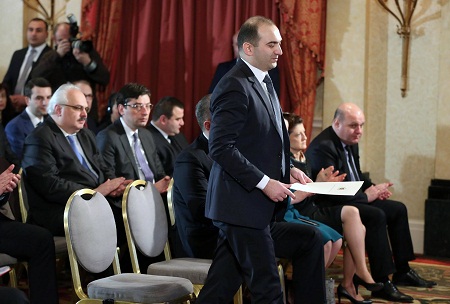First members of new Prosecutorial Council elected

The first Conference of Prosecutors in Georgia has elected eight members of the new 15-member Prosecutorial Council, tasked with selecting the country’s future Chief Prosecutors.
About 400 Georgian prosecutors from all parts of the country convened in Tbilisi yesterday for the first part of the new initiative to elect a Chief Prosecutor.
The attendees were divided into 12 different initiative groups, who each named their favourite candidates for the Council. All 400 prosecutors voted on who they wanted to be part of the 15-member Prosecutorial Council, and the top eight were revealed.
The eight chosen prosecutors were: Mamuka Pipia, Anzor Ustiadze, Giga Dzneladze, Natia Songhulashvili, Gocha Parulava, Konstantine Siradze, Ana Kalandadze and Giorgi Gaboidze.
Georgia’s current Chief Prosecutor Giorgi Badashvili, said this was historic for Georgia as it ensured future Chief Prosecutors were elected fairly, transparently and democratically. At the conference he revealed the remaining six members of the Council should be elected before October 29, to coincide with the Council’s first meeting.
Badashvili added the recently approved method of electing the country’s top prosecutor was the first stage of "a new era in Georgia’s prosecutorial history”.
On September 18 Parliament of Georgia approved a bill that introduced new, more complex rules of how to select and elect a Chief Prosecutor for a non-renewable six-year term.
The bill outlined creation of a 15-member Prosecutorial Council, chaired by the Minister of Justice.
Apart from the chosen eight prosecutors, members of Parliament (MPs) will take two seats; one from the majority and one from the opposition, while one seat will be held by a civil society representative and another from the academic field. Two seats will also be held by Judges of the High Council of Justice.
For the final position, the new procedures stated the Justice Minister would select three candidates and then present them to the Prosecutorial Council for approval. The Council must approve one candidate by voting; the successful nominee must gain two thirds of support. If this failed, the Justice Minister will be required to name three other candidates.
However if selected, the chosen candidate will go before the Government for approval. If the candidate was disliked, the process of selecting nominees will begin again. If endorsed, the candidate must then be approved by Parliament.
Parliament should confirm the candidate before the candidate is officially appointed to the role of Chief Prosecutor of Georgia.
 Tweet
Tweet  Share
Share